
The Breakfast Club is a 1985 American teen coming-of-age comedy-drama film written, produced, and directed by John Hughes. It stars Emilio Estevez, Anthony Michael Hall, Judd Nelson, Molly Ringwald and Ally Sheedy as teenagers from different high school cliques who spend a Saturday in detention with their authoritarian assistant principal.

The Lost Weekend is a 1945 American film noir drama film directed by Billy Wilder starring Ray Milland and Jane Wyman. It was based on Charles R. Jackson's 1944 novel of the same title about an alcoholic writer. The film was nominated for seven Academy Awards and won four: Best Picture, Best Director, Best Actor, and Best Adapted Screenplay. It also shared the Grand Prix at the first Cannes Film Festival, making it one of only three films to win both the Academy Award for Best Picture and the highest award at Cannes.

Rebel Without a Cause is a 1955 American drama film about emotionally confused suburban, middle-class teenagers. Filmed in the then recently introduced CinemaScope format and directed by Nicholas Ray, it offered both social commentary and an alternative to previous films depicting delinquents in urban slum environments. The film stars James Dean, Sal Mineo, and Natalie Wood.

What's Opera, Doc? is a 1957 American Warner Bros. Merrie Melodies cartoon directed by Chuck Jones and written by Michael Maltese. The short was released on July 6, 1957, and stars Bugs Bunny and Elmer Fudd.
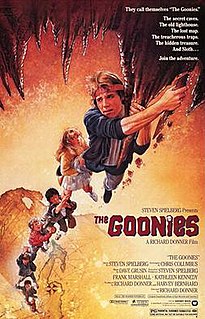
The Goonies is a 1985 American adventure comedy film co-produced and directed by Richard Donner from a screenplay by Chris Columbus, based on a story by executive producer Steven Spielberg. In the film, kids who live in the "Goon Docks" neighborhood of Astoria, Oregon, attempt to save their homes from foreclosure and, in doing so, they discover an old treasure map that takes them on an adventure to unearth the long-lost fortune of One-Eyed Willy, a legendary 17th-century pirate. During the adventure, they are chased by a family of criminals who want the treasure for themselves.
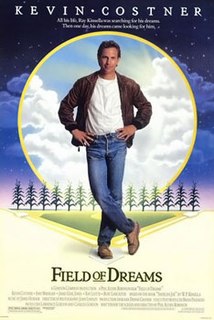
Field of Dreams is a 1989 American sports fantasy drama film written and directed by Phil Alden Robinson, adapting W. P. Kinsella's 1982 novel Shoeless Joe. The film stars Kevin Costner as a farmer who builds a baseball field in his cornfield that attracts the ghosts of baseball legends, including Shoeless Joe Jackson and the Chicago Black Sox. Amy Madigan, James Earl Jones, and Burt Lancaster also star. It was theatrically released on May 5, 1989.

Young Frankenstein is a 1974 American comedy horror film directed by Mel Brooks. The screenplay was co-written by Brooks and Gene Wilder. Wilder also starred in the lead role as the title character, a descendant of the infamous Dr. Victor Frankenstein, and Peter Boyle as the monster. The film co-stars Teri Garr, Cloris Leachman, Marty Feldman, Madeline Kahn, Kenneth Mars, Richard Haydn, and Gene Hackman.

The Court Jester is a 1955 musical-comedy, medieval romance, costume drama film starring Danny Kaye, Glynis Johns, Basil Rathbone, Angela Lansbury and Cecil Parker.

The Wizard of Oz is a 1939 American musical fantasy film produced by Metro-Goldwyn-Mayer. An adaptation of L. Frank Baum's 1900 children's fantasy novel The Wonderful Wizard of Oz, the film was primarily directed by Victor Fleming, and stars Judy Garland, Frank Morgan, Ray Bolger, Bert Lahr, Jack Haley, Billie Burke and Margaret Hamilton. Noel Langley, Florence Ryerson, and Edgar Allan Woolf received credit for the screenplay, but others made uncredited contributions. The songs were written by Edgar "Yip" Harburg and composed by Harold Arlen. The musical score and incidental music were composed by Herbert Stothart.

In a Lonely Place is a 1950 American film noir directed by Nicholas Ray and starring Humphrey Bogart and Gloria Grahame, produced for Bogart's Santana Productions. The script was written by Andrew P. Solt from Edmund H. North's adaptation of Dorothy B. Hughes' 1947 novel of the same name.

Dracula is a 1931 American pre-Code supernatural horror film directed and co-produced by Tod Browning from a screenplay written by Garrett Fort. It is based on the 1924 stage play Dracula by Hamilton Deane and John L. Balderston, which in turn is adapted from the 1897 novel Dracula by Bram Stoker. The film stars Bela Lugosi as Count Dracula, a vampire who emigrates from Transylvania to England and preys upon the blood of living victims, including a young man's fiancée.
"Carry Me Back to Old Virginny" is a song written circa 1878 by James A. Bland (1854–1911), an African-American composer and minstrel performer. It was Virginia's state song from 1940 until 1997.

"Cry Me a River" is a popular American torch song, written by Arthur Hamilton, first published in 1953 and made famous in 1955 with the version by Julie London.

Ray McKinley was an American jazz drummer, singer, and bandleader.

The National Recording Registry is a list of sound recordings that "are culturally, historically, or aesthetically important, and/or inform or reflect life in the United States." The registry was established by the National Recording Preservation Act of 2000, which created the National Recording Preservation Board, whose members are appointed by the Librarian of Congress. The recordings preserved in the United States National Recording Registry form a registry of recordings selected yearly by the National Recording Preservation Board for preservation in the Library of Congress.
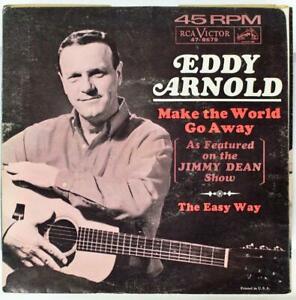
"Make the World Go Away'" is a country pop song composed by Hank Cochran. It has become a Top 40 popular success three times: for Timi Yuro, for Eddy Arnold (1965), and for the brother-sister duo Donny and Marie Osmond (1975). The original version of the song was recorded by Ray Price during 1963. It has remained a country crooner standard ever since.
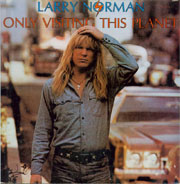
Only Visiting This Planet is a Christian rock album recorded by Larry Norman in 1972. The album was selected as the second-best album in CCM Magazine's The 100 Greatest Albums in Christian Music. In April 2014 the album was announced as one of 25 sound recordings inducted for 2013 into the Library of Congress National Recording Registry, that preserves as "cultural, artistic and/or historical treasures, representing the richness and diversity of the American soundscape", making it the first Christian rock album chosen for the registry.

Dream Days at the Hotel Existence is the sixth studio album by Australian rock band Powderfinger, released by Universal Music on 2 June 2007 in Australia, 19 November 2007 in the United Kingdom, and 11 November 2008 in the United States on the Dew Process label. It was released in Australia with a limited edition bonus DVD, titled Powderfinger's First XI, featuring eleven music videos spanning the band's career, from the first single, "Tail" to "Bless My Soul", the band's latest single before the release of the album. A collector's edition, including a CD and DVD, was released on 18 April 2008.
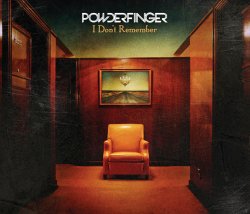
"I Don't Remember" is a song by Australian alternative rock band Powderfinger, from the album Dream Days at the Hotel Existence. It made its radio debut on 9 July 2007 on Australian radio stations, and was subsequently released as a single and digital download on 4 August 2007 in Australia, 3 September 2007 in New Zealand, and 13 August 2007 in the United States.

The National Film Registry (NFR) is the United States National Film Preservation Board's (NFPB) collection of films selected for preservation.


















